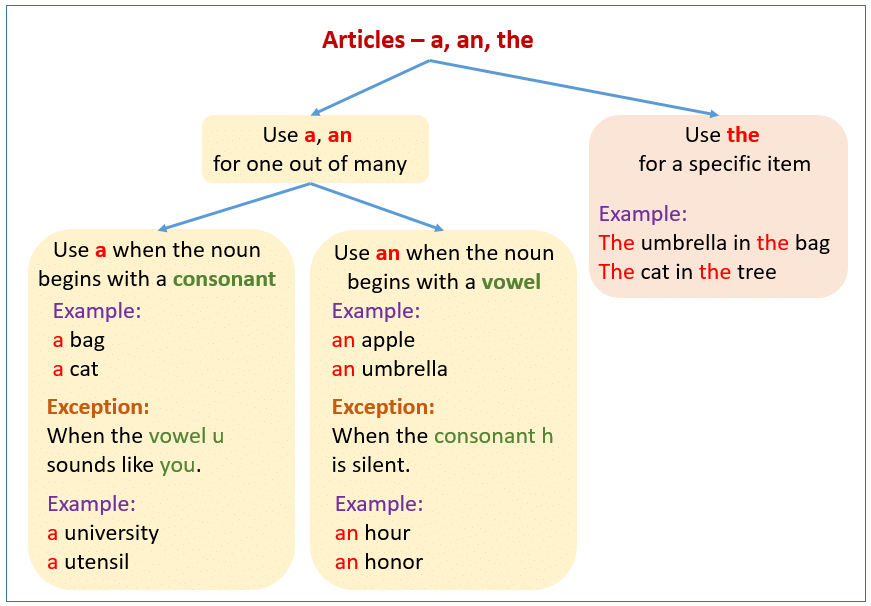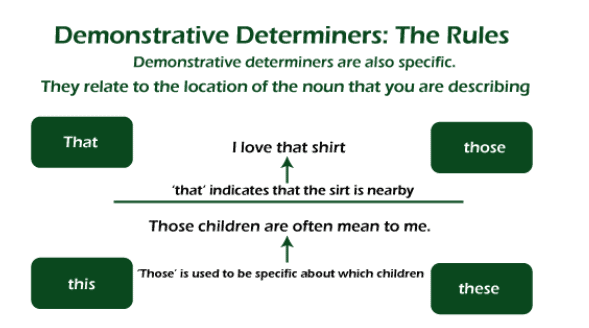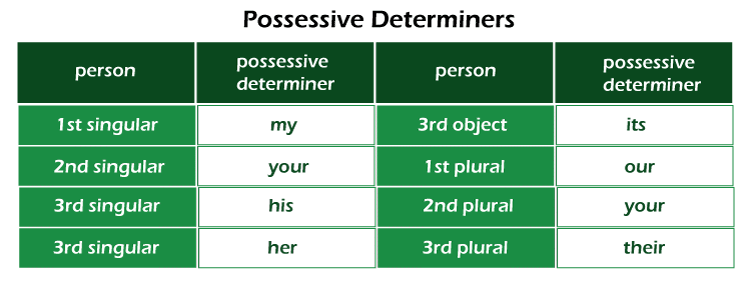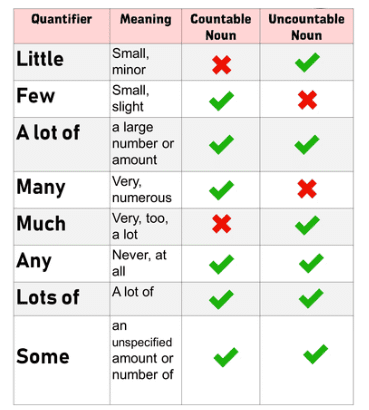Determiners | English Grammar for Class 6 PDF Download
| Table of contents |

|
| What are Determiners? |

|
| Articles |

|
| Demonstrative Determiners |

|
| Possessive Determiners |

|
| Quantifiers |

|
| Numbers |

|
| Distributive |

|
What are Determiners?
Determiners are words that are used before nouns to clarify what the noun is referring to. They help define, specify, or limit the meaning of a noun.
For example:
- Articles like "a," "an," and "the" are determiners. "A cat" means any cat, while "the cat" refers to a specific cat.
- Possessive Determiners show ownership, like "my," "your," or "their" (e.g., "my book").
- Demonstrative Determiners point out specific things, like "this," "that," "these," or "those" (e.g., "this car").
- Numeral Determiners indicate numbers, like "one," "two," or "several" (e.g., "three apples").
- Quantitative Determiners show quantity, like "some," "many," or "few" (e.g., "many students").
They are essential in making sentences clearer and more specific.
Articles
Articles are words that define whether something is specific or general. They are divided into two categories:
- Indefinite Articles: 'A' and 'An'
- Definite Article: 'The'
1. Indefinite Articles: "A" and "An"
"A" and "an" are used with singular, countable nouns when we talk about something for the first time or something that is not specific.
Rule:
- Use "a" before words that begin with a consonant sound.
- Use "an" before words that begin with a vowel sound.
Examples:
A:
- "I saw a dog in the park."
- "She is a teacher."
- "He bought a useful tool." (Even though "useful" starts with 'u,' it has a consonant sound 'yoo.')
An:
- "I ate an apple."
- "She is an engineer."
- "He arrived an hour late." (Even though "hour" starts with 'h,' it is silent, so the word starts with a vowel sound.)

2. Definite Article: "The"
"The" is used with singular or plural nouns when referring to something specific or something that has been mentioned before.
Examples:
- "I saw a dog in the park. The dog was very friendly."
- "She is the best student in the class."
- "We visited the Eiffel Tower during our trip."
3. Omission of Articles
No article is used before proper nouns, uncountable nouns, and when talking about things in a general sense.
Examples:
- "John is going to school." (Proper noun: no article needed)
- "Water is essential for life." (Uncountable noun: no article needed)
- "Dogs are loyal animals." (General sense: no article needed)
Demonstrative Determiners
"This" and "that" are used before singular nouns (naming one thing), while "these" and "those" are used before plural nouns (naming more than one thing).
Examples:
- This: "This student is my brother."
Talking about one student who is close to me. - These: "These books are ours."
Talking about more than one book that is close to me. - That: "That cat is mine."
Talking about one cat that is far from me.

NOTE:
- Use "this" and "these" for things or people that are near you.
- Use "that" and "those" for things or people that are farther away from you.
Possessive Determiners
My, our, your, his, her, its, their are called possessives. They are used to show that something belongs to someone or is related to someone.
Examples:
- My: "He is my brother." (The brother belongs to me.)
- Your: "Your brother is coming." (The brother belongs to you.)

Quantifiers
Little:
- This word is used before uncountable nouns and means a very small amount or almost nothing.
- Example: "I am very busy. I have little time for fun."
A Little:
- This also goes before uncountable nouns but means a small amount.
- Example: "There is a little milk in the jug."
The Little:
- This is used before uncountable nouns and means all of that very small amount.
- Example: "I ate the little food you gave me."
Few:
- This word is used before plural countable nouns and means a very small number or almost none.
- Example: "He has few books."
A Few:
- This is also used before plural countable nouns and means a small number, but more than just a few.
- Example: "Only a few boys passed in English."
The Few:
- This is used before plural countable nouns and means all of those small numbers.
- Example: "I have already read the few books I had."
Many:
- This word is used before plural countable nouns and means a large number.
- Example: "I have many friends."
Much:
- This is used before uncountable nouns and means a large amount.
- Example: "I don’t have much milk."
Some:
- This word is used before both countable and uncountable nouns in positive sentences and to make offers or requests. It means a small amount or number.
- Examples:
- "There is some milk in the pot."
- "Will you spare some time for me?"

Any:
- This is also used before both countable and uncountable nouns and means a small amount or number. It is usually used in negative and question sentences, but it can also be used in positive sentences with negative words.
- Examples:
- "He didn’t do any work."
- "Are there any pens?"
- "He has hardly any work to do."
Various and Several:
- Various is used before plural countable nouns to talk about many different things or people.
- Several is used before plural countable nouns to talk about many things or people of the same kind.
- Examples:
- "Various books were lying on the table."
- "He sold several books."
Enough:
- This word is used before both countable and uncountable nouns and means the right or needed amount or number.
- Example: "I have enough money."
Both:
- This is used before countable nouns to show that there are two of something. It can also be used before uncountable nouns if they are of two types.
- Examples:
- "Both of them were wise."
- "I will drink both milk and tea."
 |
Download the notes
Determiners
|
Download as PDF |
Numbers
Numbers can be used as determiners to show how many of something there are. They are of two types:
(a) Definite Numbers: These are numbers that give a specific amount, like one, two, first, or second.
- Example: "She has two dogs." Here, "two" is a definite number because it tells exactly how many dogs she has.
(b) Indefinite Numbers: These are words that give a general idea of the amount, not an exact number. Examples include some, many, many a, a few, all, lots of, a great deal of, a good deal of, plenty of, a large number of, several, etc.
- Example: "There are many books on the shelf." Here, "many" gives a general idea that there are a lot of books, but it doesn’t say exactly how many.
More about Indefinite Numbers:
Many a: This phrase means "several," but it’s used with a singular noun.
- Example: "Many a student has faced this challenge." This means several students have faced the challenge, but "student" is used in singular form.
All: This word means everything or everyone.
- Example: "All the children were happy." This means every child was happy.
A lot of, a great deal of, a good deal of, plenty of, a large number of: These phrases all mean a large amount or number. They can be used before both singular uncountable nouns and plural countable nouns.
- Example: "She has a lot of patience." (Here, "patience" is uncountable.)
- Example: "There are a large number of people at the event." (Here, "people" is countable.)
Distributive
Each, every, either, and neither are words used to talk about one person or thing out of a group of many people or things.
- Each: This is used when talking about a specific number of people or things. It is used when the group is small or the number is known.
Example: "Each question carries equal marks."
Here, we are talking about each question in a specific set of questions. - Every: This is used when talking about people or things in a group where the number is not known or is large.
Example: "Every word of this letter is correct."
Here, we're talking about every word in the entire letter. - Either: This is used to refer to one of two options.
Example: "Either room is good."
Here, either of the two rooms being talked about is good. - Neither: This is used to say that none of the two options are correct or applicable.
Example: "Neither boy was present."
Here, neither of the two boys was present. - Only: This is used to indicate that there is just one thing or person and nothing else.
Example 1: "Sangeeta is the only girl fit to take this responsibility."
Here, Sangeeta is the only one who can take responsibility.
Example 2: "The bank is the only place where our money is safe."
Here, the bank is the only safe place for money.
Example 3: "Rahim is the only cook who can cook such delicious food."
Here, Rahim is the only cook who can make this kind of tasty food.
|
48 videos|261 docs|45 tests
|
FAQs on Determiners - English Grammar for Class 6
| 1. What is the difference between articles and possessive determiners? |  |
| 2. How do demonstrative determiners differ from distributive determiners? |  |
| 3. Can numbers be considered as determiners? |  |
| 4. What is the purpose of quantifiers in a sentence? |  |
| 5. How can determiners help clarify the meaning of a sentence? |  |




























